I'm using WinForms. How to add a row with horizontally merged cells to DataGridView? Something like WorkingTime and Touchdown Count cells on the following picture:
Asked
Active
Viewed 3,334 times
3
-
Please check this thread, it answers your question pretty much https://stackoverflow.com/questions/16774966/how-to-merge-datagridview-cell-in-winforms – Max Shevchenko Jul 10 '19 at 09:00
-
1As I can see you advice me to set `e.AdvancedBorderStyle.Right = DataGridViewAdvancedCellBorderStyle.None` inside `dataGridView1_CellPainting` event? That is not suitable for horisontal merge because first column (if I will place **Working Time** string into first cell of the row) will be autosized by its length. It will not look like merged column, but something [like that](https://i.imgur.com/qzLLG0k.jpg) – bairog Jul 10 '19 at 09:22
-
This is not well supported. To workaround you can hide some borders but the content will not be centered unless you ownerdraw it.. [See here](https://stackoverflow.com/questions/52484960/hide-specified-cell-borders-in-datagridview/52487741?r=SearchResults&s=2|30.7765#52487741) – TaW Jul 10 '19 at 09:24
-
@TaW - I've produced some code, that works for me (not only borders but centered content as well using custom `CellPainting` event). But I cannot answer my own question because you closed it. Open It please - so will be able to add full and correct solution. Thx. – bairog Jul 10 '19 at 10:41
1 Answers
1
Here is working code for horizontal merge of the first row (both for centering cell content and proper border painting), initial code was found on MSDN:
private void dataGridView1_CellPainting(object sender, DataGridViewCellPaintingEventArgs e)
{
//mering all cells in a first row
if (e.RowIndex == 0)
{
if (e.ColumnIndex == 0)
{
e.PaintBackground(e.ClipBounds, true);
Rectangle r = e.CellBounds;
for (int i = 1; i < (sender as DataGridView).ColumnCount; i++)
r.Width += (sender as DataGridView).GetCellDisplayRectangle(i, 0, true).Width;
r.Width -= 1;
r.Height -= 1;
using (SolidBrush brBk = new SolidBrush(e.CellStyle.BackColor))
using (SolidBrush brFr = new SolidBrush(e.CellStyle.ForeColor))
{
e.Graphics.FillRectangle(brBk, r);
StringFormat sf = new StringFormat();
sf.Alignment = StringAlignment.Center;
sf.LineAlignment = StringAlignment.Center;
e.Graphics.TextRenderingHint = TextRenderingHint.AntiAliasGridFit;
e.Graphics.DrawString(e.Value.ToString(), e.CellStyle.Font, brFr, r, sf);
}
e.Handled = true;
}
else
if (e.ColumnIndex > 0)
{
using (Pen p = new Pen((sender as DataGridView).GridColor))
{
//bottom line of a cell
e.Graphics.DrawLine(p, e.CellBounds.Left, e.CellBounds.Bottom - 1, e.CellBounds.Right, e.CellBounds.Bottom - 1);
//right vertical line of a last cell in a row
if (e.ColumnIndex == (sender as DataGridView).ColumnCount - 1)
e.Graphics.DrawLine(p, e.CellBounds.Right - 1, e.CellBounds.Top, e.CellBounds.Right - 1, e.CellBounds.Bottom);
}
e.Handled = true;
}
}
}
private void dataGridView1_Scroll(object sender, ScrollEventArgs e)
{
//force redraw first row when scrolling
for (int i = 0; i < (sender as DataGridView).ColumnCount; i++)
(sender as DataGridView).InvalidateCell(i, 0);
}
bairog
- 3,143
- 6
- 36
- 54
